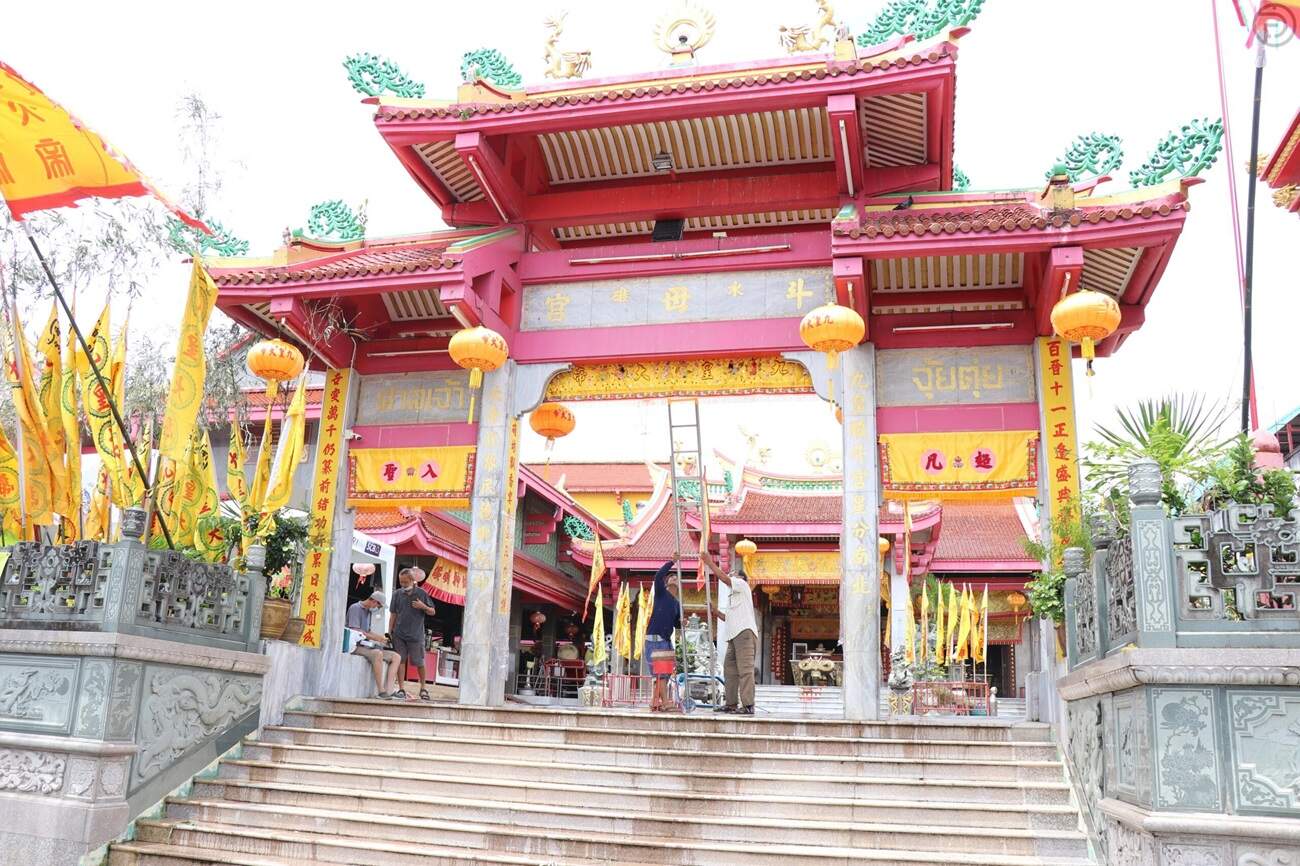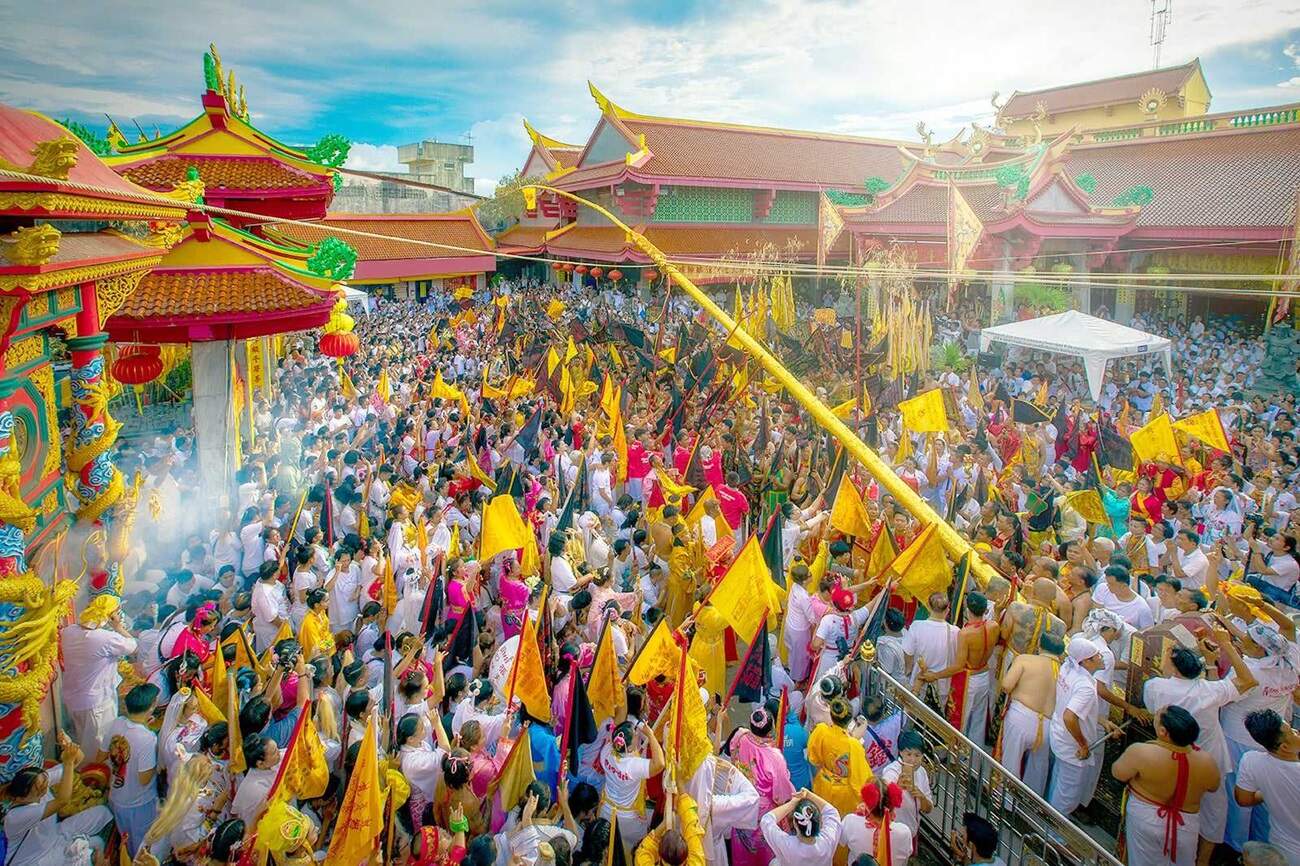You may be wondering why the island of Phuket would take nine days to celebrate vegetarianism. Apart from the sizable Buddhist and Taoist population in the island and a heightened emphasis on wellness, a vegetarian festival might sound strange to tourists, especially those who are not used to plant-based eating. But the Phuket Vegetarian Festival is a celebration, not just of clean eating, but of spiritual purity.
The origins of the Phuket Vegetarian Festival, happening on the ninth month of the Taoist calendar (between the last week of September and the first few weeks of October) have its roots in tradition. Legend has it that a Chinese opera troupe got stranded in Phuket and fell ill with malaria, only to be healed completely by following a strict plant-based diet.
The celebrations are most common within the island’s Peranakan community. It combines traditions from Buddhism, Taoism, and Hinduism in a massive feast. The festival is also known as the feast of the Nine Emperor Gods, though the Hindu god Shiva is also known to make an appearance during the festivities.
Related Article: Phuket’s Most Popular Festivals and When They Happen
What Visitors Should Know About the Phuket Vegetarian Festival
The Phuket Vegetarian Festival, also known as Jia Chai, does not require visitors to participate fully as devotees do. What is expected of visitors, however, is to follow a few rules out of respect for the true devotees celebrating the festival itself. One does not have to be a vegetarian to enjoy the Vegetarian Festival, but there are considerations to follow to get the best experience.
1. Purity Is at The Heart of The Vegetarian Festival

Devotees are asked to follow 10 important principles before and during their participation in Jia Chai. Among the principles are the requirement to refrain from meat, alcohol, sexual intercourse, strong-smelling food, and all manners of lying and cheating. On the festival’s days, devotees must wear white clothing to represent cleanliness and purity.
Prior to the festival, the Chinese temples of Phuket undergo a thorough cleansing in preparation for the spiritual aspects of the celebration. These cleansing rituals are important, since welcoming the presence of the gods is part of the festivities.
2. Visitors Must Abide by The Rules
While visitors are not required to adhere to the same rules as devotees, part of the 10 Principles of Jia Chai is the restriction of attendance for certain groups. Women who are menstruating during Jia Chai are not allowed to attend, as are pregnant women and those who are in a state of mourning.
When it comes to cleanliness, the 10 Principles also state that the utensils used by devotees must be segregated from those used by non-devotees at the festival, to maintain the devotees’ state of purity.
3. Phuket Old Town Will Be Completely Vegetarian
Since all meat products are banned during Jia Chai, non-vegetarian restaurants in Phuket Old Town and other areas celebrating the festival will be closed, and restaurants with the “Jay” designation (signifying vegetarianism that adheres to strict Buddhist standards) will be allowed to sell food during the festival.
Interestingly, vegetables are not always served during the Vegetarian Festival. Most of the food products available are made from noodles, rice, and tofu or plant proteins cooked to resemble meat dishes. Jay restaurants also avoid the use of herbs such as garlic and onions as part of their religious principles, but that doesn’t stop restaurants from making vegetarian versions of healthy Thai favorites and crowd pleasers such as vegan sushi.
And for guests who would rather consume meat, rest assured that beach resorts and luxury private villas in Phuket are often exempted from the Vegetarian Festival, so there’s no worry about going completely plant-based for nine days.
4. Be On The Lookout for Unique Festival Attractions
Street celebrations are common in the festival, and there are a few participants who will join the parade in different states of self-mutilation, piercing their bodies in different ways with various instruments to represent purity and sacrifice. While this is a fascinating sight, it may also trigger children and adults who are sensitive to mutilation, so it’s recommended to watch with caution.
Another aspect of Jia Chai involves fireworks. On the last day of the festival, fireworks are thrown at the participants during the last of the street celebrations, which could lead to loud noises and heavy smoke. Again, caution is recommended for guests who are sensitive to these.
Related article: Cultural Attractions in Phuket
Should Visitors Attend the Phuket Vegetarian Festival?
The principles behind Jia Chai may be intimidating, but the truth of the matter is that the Phuket Vegetarian Festival is part of the culture that makes the island unique. Jia Chai shows a special side of Phuket that not many guests know about, beyond the pristine beaches and vibrant nightlife.
For those who are inclined toward exploring new cultures and spiritual practices, it’s best to attend Jia Chai with an open mind. The vegetarianism and spiritual purity celebrated during this festival may be a far cry from what most are used to, but it is worth exploring if one is to develop an understanding of what makes the people and culture of Phuket extraordinary.
And even if the dishes are completely meat-free, they’re always worth a try. The preparation of plant proteins during the Vegetarian Festival is designed to approximate the experience of eating animal products, so it’s worth trying to see if the plant-based versions measure up to the real thing.
Celebrations like the Phuket Vegetarian Festival are worth experiencing at least once in a lifetime. Book a luxury private villa with Luxe Phuket for this celebration and our friendly concierge services can assist you with the Jia Chai experience.
Related Article: Thai Cuisine: 10 Must-Try Dishes When In Phuket
–
Featured Image by Hotels.com





